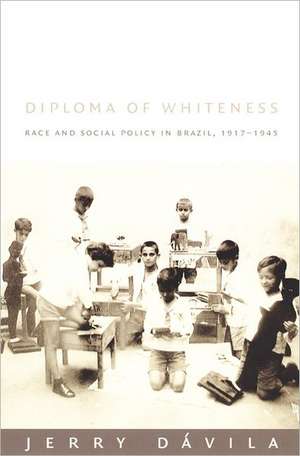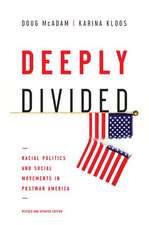Diploma of Whiteness – Race and Social Policy in Brazil, 1917–1945
Autor Jerry Dávilaen Limba Engleză Paperback – 18 mar 2003
Providing a unique historical perspective on how racial attitudes move from elite discourse into people's lives, "Diploma of Whiteness" shows how public schools promoted the idea that whites were inherently fit and those of African or mixed ancestry were necessarily in need of remedial attention. Analyzing primary material--including school system records, teacher journals, photographs, private letters, and unpublished documents--Davila traces the emergence of racially coded hiring practices and student-tracking policies as well as the development of a social and scientific philosophy of eugenics. He contends that the implementation of the various policies intended to "improve" nonwhites institutionalized subtle barriers to their equitable integration into Brazilian society.
Preț: 262.41 lei
Nou
Puncte Express: 394
Preț estimativ în valută:
50.24€ • 52.32$ • 41.69£
50.24€ • 52.32$ • 41.69£
Carte tipărită la comandă
Livrare economică 14-28 februarie
Preluare comenzi: 021 569.72.76
Specificații
ISBN-13: 9780822330707
ISBN-10: 0822330709
Pagini: 312
Ilustrații: 41 illustrations
Dimensiuni: 155 x 228 x 27 mm
Greutate: 0.52 kg
Editura: MD – Duke University Press
ISBN-10: 0822330709
Pagini: 312
Ilustrații: 41 illustrations
Dimensiuni: 155 x 228 x 27 mm
Greutate: 0.52 kg
Editura: MD – Duke University Press
Recenzii
"By taking an innovative approach to the study of race and social policy, Jerry Dávila has written a rare book that shows how racial attitudes move from elite discourse into the real lives of real people. This approach combines with fascinating research and a narrative style that is compelling and often dramatic to make a first-rate contribution to the fields of Latin American and Brazilian history." Jeffrey Lesser, author of Negotiating National Identity: Immigrants, Minorities, and the Struggle for Ethnicity in Brazil"A superbly researched analysis of the application of the whitening ideal, with all its contradictions, in the Rio de Janeiro schools during the interwar years." Thomas Skidmore, author of Black into White: Race and Nationality in Brazilian Thought
"By taking an innovative approach to the study of race and social policy, Jerry Davila has written a rare book that shows how racial attitudes move from elite discourse into the real lives of real people. This approach combines with fascinating research and a narrative style that is compelling and often dramatic to make a first-rate contribution to the fields of Latin American and Brazilian history." Jeffrey Lesser, author of Negotiating National Identity: Immigrants, Minorities, and the Struggle for Ethnicity in Brazil "A superbly researched analysis of the application of the whitening ideal, with all its contradictions, in the Rio de Janeiro schools during the interwar years." Thomas Skidmore, author of Black into White: Race and Nationality in Brazilian Thought
"By taking an innovative approach to the study of race and social policy, Jerry Davila has written a rare book that shows how racial attitudes move from elite discourse into the real lives of real people. This approach combines with fascinating research and a narrative style that is compelling and often dramatic to make a first-rate contribution to the fields of Latin American and Brazilian history." Jeffrey Lesser, author of Negotiating National Identity: Immigrants, Minorities, and the Struggle for Ethnicity in Brazil "A superbly researched analysis of the application of the whitening ideal, with all its contradictions, in the Rio de Janeiro schools during the interwar years." Thomas Skidmore, author of Black into White: Race and Nationality in Brazilian Thought
Notă biografică
Jerry Dávila
Textul de pe ultima copertă
"A superbly researched analysis of the application of the whitening ideal, with all its contradictions, in the Rio de Janeiro schools during the interwar years."--Thomas Skidmore, author of "Black into White: Race and Nationality in Brazilian Thought"
Cuprins
Descriere
Asserts that Brazilian mid-century educational reforms, designed to end rigid, race-based exclusions and to incorporate the poor, did so by stressing whiteness as the primary characteristic of modernity











